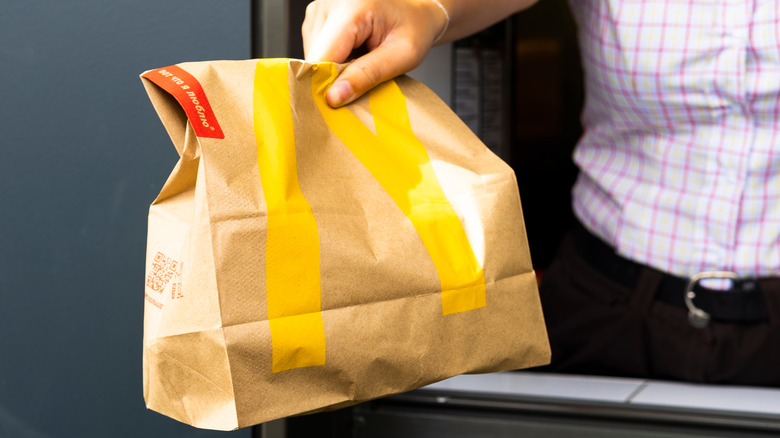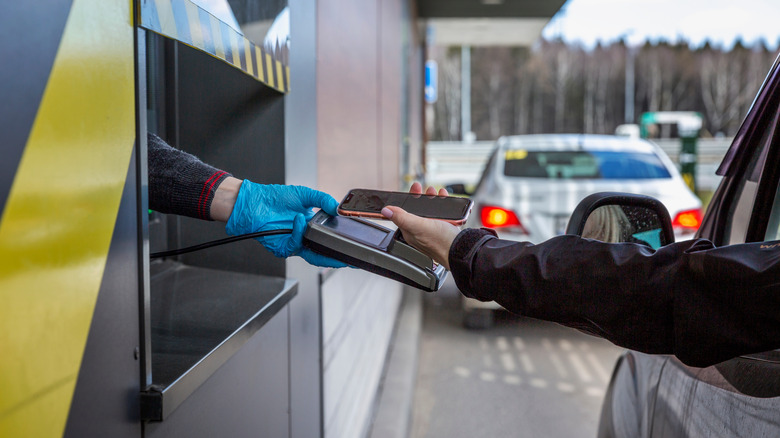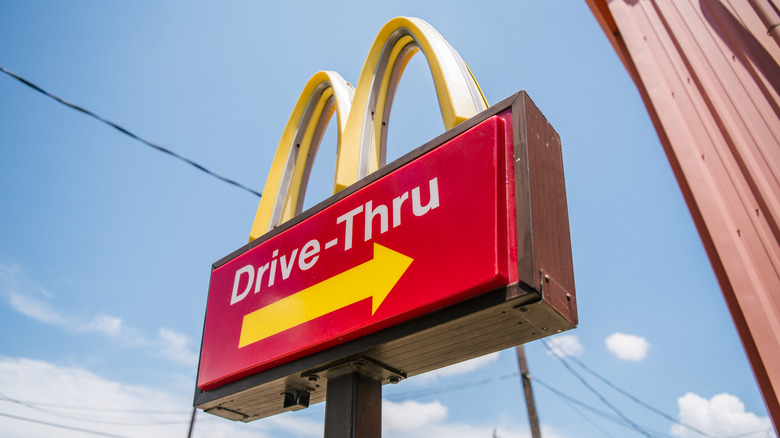McDonald's Employee Has TikTok Shook After Exposing This Drive-Thru Fact
Typically, a trip through the McDonald's drive-thru is experienced as a relatively private affair. You pull in, say a few words to a speaker, and exchange money for a bag containing your order. However, a recent TikTok has caused customers to feel seen — and not in an affirming way.
As reported by Australian media outlet 7News, a TikTok user based in the U.K. shared a selfie video taken during their shift at McDonald's with text that read, "The fact that people don't know we can hear your convos even when we aren't speaking to you or taking your order." Another text block explained that the chain also takes photos of the drivers in order to match each face with the right order. One could perhaps write off the video as a prank. After all, one does what one must to relieve the tedium of work.
However, some responses to the post appeared to come from other employees who backed up the assertion. "As a former fast food worker," one wrote, "I can 100% confirm that the instant you pull up to the speaker, it keys up the earpiece." "When you hear people shouting at their kids that's the best," another joked. A few others, however, piped up, stating that their drive-thrus do not take photographs. Regardless, you may want to remember to have your out-in-public behavior turned on from the moment you pull up to the menu until you drive away just in case there's a camera.
Responses ranged all over
Some people were most surely shook. "I now have anxiety about going to McDonald's drive through ... Great," one person wrote in response to the TikTok video. Others expressed their dread in two simple words: "OH NO." Meanwhile, multiple people seemed to cling to the comfort of skepticism, asking if it was true. At least one viewer felt that this surveillance constituted a violation of not only privacy but the law, writing, "I'm pretty sure taking pics of people like that without their permission like that is illegal."
This wasn't the only such post that had people shook or possibly even shaking in their probably-on-camera-boots. Recently, The New York Post reported on a New Zealand-based McDonald's employee who made a similar TikTok video that has since been taken down. An all-caps response quoted by the Post read, "THEY TAKE YOUR PIC WHAT NOOO."
Some, however, seemed to take the fact they were being surveilled in their stride. They were instead struck by the fact that despite McDonald's workers being able to listen to them and take photographs, their orders still came out messed up. As one person remarked on TikTok, "And most of the time they still get your order wrong even though they 'take' out pictures." This arguably reflects a public attitude VentureBeat wrote about in 2019. People treat their biometric information, a category that includes pictures of their faces, as a negotiating tool for better service. This dovetails with the broader notion that with more efficient service, fewer people complain.
Some people probably will not like McDonald's other info gathering practices
The alarm some people experienced when they learned that the people taking their drive-thru orders could hear them beyond their immediate interaction (and potentially photograph them in the process) is one thing. Another concept entirely is that McDonald's has ways of recording your information even when you're not at the restaurant. In 2017, the Chicago Tribune detailed how McDonald's had decided to track the choices made by customers ordering through the mobile app: What they eat, whether they eat in or dine out, how often they visit, and more information would be saved so the restaurant could serve its patrons as efficiently as possible. Reddit users who have the app warned others to turn off its permission to track their activity on other services.
McDonald's has also been testing drive-thru systems that use artificial intelligence, rather than human workers, to take customers' orders and analyze their voice recordings, Restaurant Business reports. This prompted a lawsuit from an Illinois customer alleging that McDonald's violated state law by not getting his permission to use voice recognition technology before taking his order. The system is meant to remember repeat customers based on their unique voices and license plates and then present them with menu options based on their previous orders.
Now that the internet is learning more about McDonald's information-gathering practices, perhaps their revelations will prompt resistance against the recording of customers' data — or at least a newfound attention to drive-thru etiquette.


